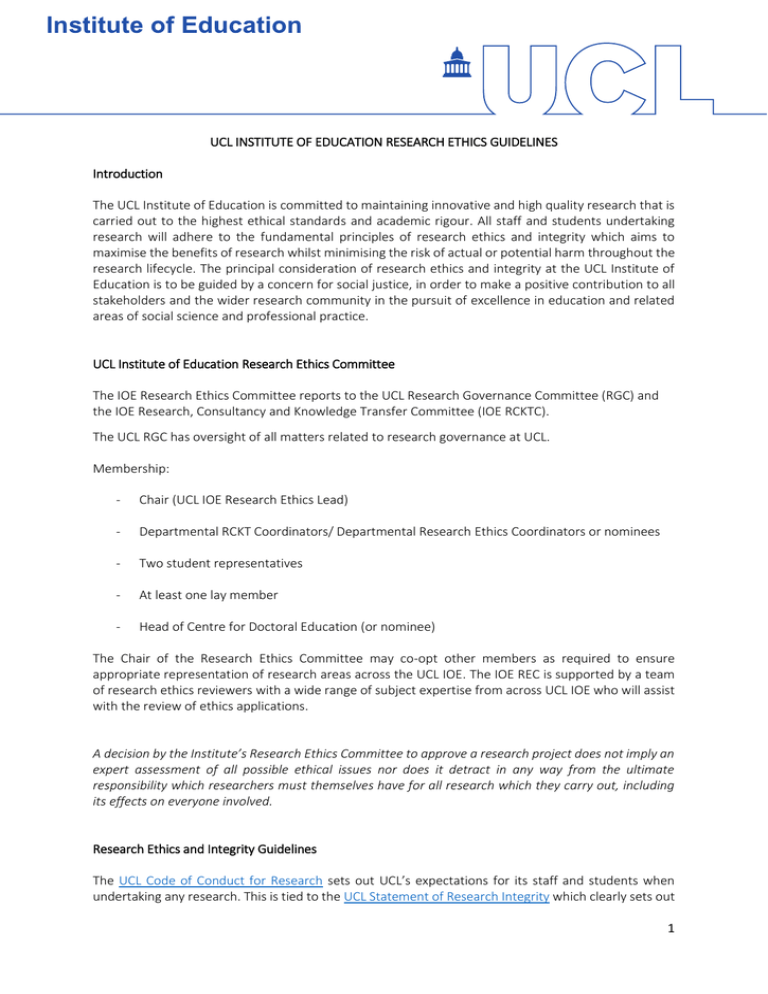UCL INSTITUTE OF EDUCATION RESEARCH ETHICS GUIDELINES Introduction
advertisement

UCL INSTITUTE OF EDUCATION RESEARCH ETHICS GUIDELINES Introduction The UCL Institute of Education is committed to maintaining innovative and high quality research that is carried out to the highest ethical standards and academic rigour. All staff and students undertaking research will adhere to the fundamental principles of research ethics and integrity which aims to maximise the benefits of research whilst minimising the risk of actual or potential harm throughout the research lifecycle. The principal consideration of research ethics and integrity at the UCL Institute of Education is to be guided by a concern for social justice, in order to make a positive contribution to all stakeholders and the wider research community in the pursuit of excellence in education and related areas of social science and professional practice. UCL Institute of Education Research Ethics Committee The IOE Research Ethics Committee reports to the UCL Research Governance Committee (RGC) and the IOE Research, Consultancy and Knowledge Transfer Committee (IOE RCKTC). The UCL RGC has oversight of all matters related to research governance at UCL. Membership: - Chair (UCL IOE Research Ethics Lead) - Departmental RCKT Coordinators/ Departmental Research Ethics Coordinators or nominees - Two student representatives - At least one lay member - Head of Centre for Doctoral Education (or nominee) The Chair of the Research Ethics Committee may co-opt other members as required to ensure appropriate representation of research areas across the UCL IOE. The IOE REC is supported by a team of research ethics reviewers with a wide range of subject expertise from across UCL IOE who will assist with the review of ethics applications. A decision by the Institute’s Research Ethics Committee to approve a research project does not imply an expert assessment of all possible ethical issues nor does it detract in any way from the ultimate responsibility which researchers must themselves have for all research which they carry out, including its effects on everyone involved. Research Ethics and Integrity Guidelines The UCL Code of Conduct for Research sets out UCL’s expectations for its staff and students when undertaking any research. This is tied to the UCL Statement of Research Integrity which clearly sets out 1 the standards expected of all those involved with research at or in collaboration with UCL. Further information can be found on UCL’s dedicated Research Integrity webpages. Relevant policies and guidelines including Data Management & Protection, Research Misconduct and Publication & Authorship can be found here. All staff at the Institute are expected to work ethically with reference to the Code of Practice of their relevant professional association. Codes for research ethics including the British Educational Research Association (BERA), the British Sociological Association (BSA), the British Psychological Society (BPS) and the Social Research Association (SRA) can be found here. The ESRC Framework for research ethics is a useful resource for anyone involved in social science research, Research Council funded or otherwise. The UCL Institute of Education also has its own Research Ethics Guidebook which is a helpful starting point for anyone looking to familiarise themselves with research ethics in the social sciences. Alleged misconduct in any area of research including failure to obtain appropriate ethical approval will be subject to UCL’s Procedure for Investigating and Resolving Allegations of Misconduct in Academic Research. IOE Staff Members of staff at the UCL Institute of Education must submit an ethics application form to the UCL IOE Research Ethics and Governance Administrator (researchethics@ioe.ac.uk) for any activity that uses data from human participants, or research methods to collect new data from human participants. All ethics applications will be reviewed by a panel of two IOE research ethics reviewers. The ethics form for staff can be found here. For those planning to undertake research which come under the remit of NHS research ethics committees, please contact the Joint Research Office. IOE Students All students at the UCL Institute of Education must complete a student ethics application form available here. Students should submit the form to their supervisor for review. A flow chart outlining the process for reviewing student ethics applications can be found here. Any questions regarding this process should be sent to researchethics@ioe.ac.uk. In difficult cases or where an agreement on the outcome of the application cannot be made, supervisors have the option of referring the student’s application to the IOE REC for consideration. Guidance on when this may be necessary can be found here. 2



